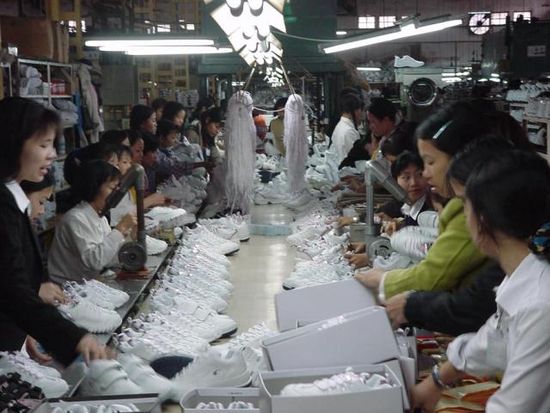Sweatshop T-Shirts
Prevalent in developing countries sweatshops are factories where people work for small wages or for doing piecework. The goods that usually come out of a sweatshop are clothes (t-shirts), electronics, toys, shoes and other consumer goods. The word sweatshop is actually a pejorative term that connotes the condition of a factory or place where the employees are made to stay in harsh conditions. Sweatshops are commonly criticized for their use children in their sweatshops while others that forbid the practice of trade unionization. Many times employees in a sweatshop are kept in a harsh environment with inadequate ventilation and are sometimes physically and mentally abused, and subjected to long hours with unsafe conditions.
Where and why are there sweatshops?
To do this, they hire, recruit and pay garment workers to cut, sew and package the clothing at very low wages. In addition to low pay many manufacturers do not pay legal wages (if they even exist in some countries) or comply with safety laws, and thus they ‘sweat’ the profit out of their workers! Large retailers such as Walmart or even down the supply chain for clothing companies such as Nike contract their work out to manufacturers at the lowest bid and in turn insist that they are not directly connected with the employment of these people and not responsible for the wages and working condition of sweatshops because it is the manufacturers responsibility.
Stringent laws, high wage levels, and competitive markets in USA and other developed countries has influenced many companies in the garment industry to moved overseas or slightly below the border (in Mexico) for the manufacture of t-shirts and clothing in sweatshops. Sweatshops are prevalent throughout Central America, Southeast Asia and the Caribbean. Many countries in these areas do not have labor laws, health codes, or environmental restrictions (or they aren’t enforced) that maintain the safety of its workers. There have been many cases of children working in sweatshops to help their family obtain basic necessities. Because the children start working at such a young age and for very long hours they have little to no opportunities to get a formal education. The lack of environmental regulations also creates a much less expensive situation for clothing manufacturers. The result is expensive for the environment. Unfortunately a $2 t-shirt does not factor in the damages to families, communities, and their surrounding environment.
Alternatives to Sweatshop T-Shirts and Clothing
Fortunately there are alternatives to sweatshop t-shirts and clothing. Over the past few years growing concerns about the effects of sweatshops on local communities and the environment have pushed certain retailers, clothing and t-shirt manufacturers (with the help of consumers!) to produce products follow principles that are far less destructive than the sweatshop model. Many of these sweatshop-free products are currently marketed as Fair Trade or socially responsible products. While these socially responsible and Fair Trade t-shirts and clothing items aren’t completely mainstream but they can easily be purchased online through a variety of merchants. With Fair Trade, many of the manufacturers not only try to be more socially responsible but they also have been increasing the number of t-shirts made from organic cotton. Organic t-shirts made from socially responsible companies are the best option because its take into account not only people and communities but the surrounding environment. For your next t-shirt make sure to ask the retailer if it was made by a socially responsible company and hopefully made from organic cotton.



